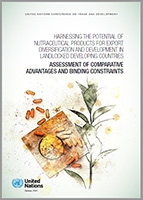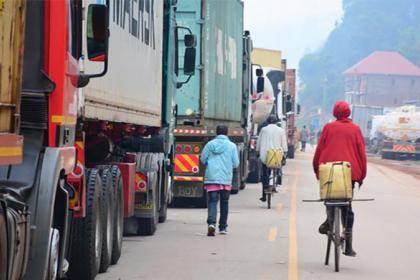
Landlocked developing countries are characterized by high levels of natural capital, limited productive capacities, dependence on a handful of unprocessed commodities and the geographical challenges of being landlocked. These challenges have been exacerbated by the disruptions to global supply chains, production and the movement of goods and persons brought about by the coronavirus disease (COVID-19) pandemic.
Despite these complex development challenges, landlocked developing countries have great potential to join successful exporters from other developing countries in nutraceutical products, owing to their rich natural capital and resources base. However, this requires effectively addressing demand and supply constraints, fostering productive capacities and putting in place regulatory and institutional mechanisms to meet the requirements of export markets in terms of international quality and safety standards.
This report explores the potential of developing nutraceutical products, health foods or health-enhancing foods for export diversification and development in landlocked developing countries. More technically known as “functional foods” and food supplements, including tropical and other fruits, vegetables and grains, these products are known or considered to have health benefits.
The report provides analysis and assessments of the comparative advantages and binding constraints facing nutraceuticals development in six landlocked countries, namely Azerbaijan, Bhutan, the Plurinational State of Bolivia, Burkina Faso, Ethiopia and Nepal.
The report argues that, for exports of nutraceuticals and other health-enhancing products, the most binding constraints are limited levels of productive capacities that, in turn, mean low production as well as lack of compliance with environmental standards, quality control measures and health-related safety requirements that export destination countries impose to protect their citizens.
Many landlocked developing countries, particularly those in the African continent and that are least developed countries, enjoy the duty-free and quota-free preferential market access opportunities offered by major development and trade partners. Having market access opportunities, however, does not mean that entry into these markets is straightforward.
The report reveals the breadth and depth of the potential of nutraceuticals. It argues that, in pursuing their export diversification and structural transformation objectives, landlocked developing countries should explore the possibility of developing production and export capacities in a diverse range of areas, sectors and economic activities.
While diversification into manufacturing is critically important, it is not the only way to achieve higher value addition, productivity growth and structural transformation over the short and medium terms. In addition, the report provides a synthesis of successful and less successful experiences of developing countries in the field, with policy lessons and recommendations for action at the national, regional and global levels.
Landlocked developing countries and their development and trade partners may consider the policy recommendations suggested in this report in formulating and implementing export diversification strategies and in realigning international support mechanisms.
Where possible, incentive structures and government support should also be targeted towards the enhanced participation of women, in particular young women, rural women and members of vulnerable population groups, in the production of nutraceuticals.
Rebeca Grynspan
Secretary-General UNCTAD




